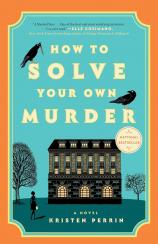How to Solve Your Own Murder
Review
How to Solve Your Own Murder
HOW TO SOLVE YOUR OWN MURDER by Kristen Perrin had me hooked from beginning to end. In fact, the book’s first sentence is part of the cryptic fortune that determines the fate of many of the characters: "Your future contains dry bones."
Teenage Frances and her two best friends go to a fair in their small, picturesque town in the English countryside. An unusual prediction from a "fortune teller" about Frances' eventual murder changes the trajectory of her life. She becomes obsessed with her fortune, parsing out every mysterious, ambiguous sentence and what it might mean. She is determined to figure out who will kill her. This obsession lasts her whole life until, in her 70s, she is, in fact, murdered.
"This book is so enjoyable that I found myself doing what I haven't done in a while --- taking it with me everywhere so I could read even just another page or two. It's a clever and carefully crafted novel that has much to recommend it."
The story is told in two timelines. In the present, we see through the eyes of Annie Adams how she was raised in a huge house in the posh Chelsea neighborhood of London with her eccentric mother, Laura, an artist whose early success was then followed by many lean years. They still live in the somewhat dilapidated house together as Annie recently lost her job and is determined to finish writing a novel. Laura has an important art show coming up, and to help clear out the basement to make way for an art studio, Annie organizes the removal of many pieces of luggage and trunks and has them sent to her Great Aunt Frances at her country estate in Castle Knoll. Frances owns the mansion where they live.
Soon after sending those items to Frances, Annie receives a letter inviting her to a meeting with her great-aunt and her great-aunt's lawyers to discuss "the responsibilities that will come with being sole benefactor of her estate and assets." Annie is shocked that she has replaced her mother in the will. But given the wording of her fortune --- "daughters are the key to justice, find the right one and keep her close" --- Frances must have decided that Annie is the "right" daughter. Frances never had children of her own, and Laura is Frances' niece, her brother's child. In a sense, they both are "daughters" of Frances' family.
So Annie travels to Castle Knoll for the meeting, though she never gets to see her great-aunt alive. Frances calls her lawyer, Walter Gordon, just as the meeting is supposed to start to explain that her car isn't working and they should come to the estate. But when they arrive there, Frances is dead. The autopsy shows that she was, indeed, murdered. She leaves behind a room filled with files and murder boards, as well as all the notes and information she has dug up on practically everyone in Castle Knoll in her determination to find out who would kill her.
Annie deeply regrets not getting to know Frances while she was alive. The diary that Frances left behind, which gives us a glimpse into the year after she received her enigmatic fortune, explains the events of 1966. She also has a surprise in store for those, including Annie, who wish to inherit the grand estate. To do so, Annie must solve the mystery of who murdered Frances before Saxon Gravesdown, Frances' husband's nephew. If neither can discover the killer’s identity within a week, then the estate will be torn up and developed, and all the monies will go to the crown.
The clues and misdirections are brilliantly created. The fact that Perrin has two timelines to work with in order to sprinkle the information and tidbits that eventually lead to Annie unmasking the perpetrator easily could become confusing. But she manages to adroitly balance it all as she makes us admire both Frances and Annie. The juxtaposition of many of the characters as irresponsible teenagers, as compared to their staid senior citizen personas in Annie's timeline, is clever but also touching. It's a reflection of the truth that who we are as very young almost-adults does not define the people we become.
One of the tragedies in the story is the disappearance of Frances' good friend, Emily. Frances, Emily and Rose had been inseparable growing up. In order to solve Frances' murder, Annie also must delve into what happened to Emily. The clever conclusion is surprising, but we see that Perrin brilliantly laid the framework to allow us to determine the identity of the villain had we just been perceptive enough. I was not.
I'm definitely thinking about using HOW TO SOLVE YOUR OWN MURDER as a book club read as it could lead to some very thoughtful discussions regarding family and moral character. Can any random "fortune" we might be told be twisted to encompass what happens in our lives? What did receiving that fortune do to Frances' ability to live life to the fullest? Also, there is the question of how life in England is both similar to and different from life in America, especially in the small, rural towns.
This book is so enjoyable that I found myself doing what I haven't done in a while --- taking it with me everywhere so I could read even just another page or two. It's a clever and carefully crafted novel that has much to recommend it.
Reviewed by Pamela Kramer on March 29, 2024




